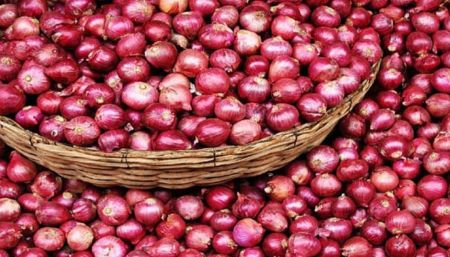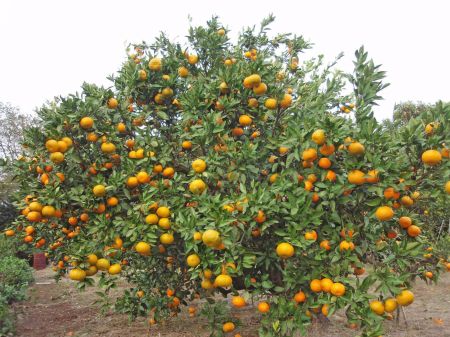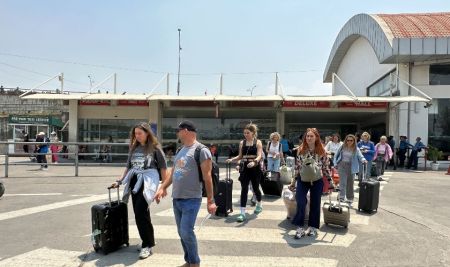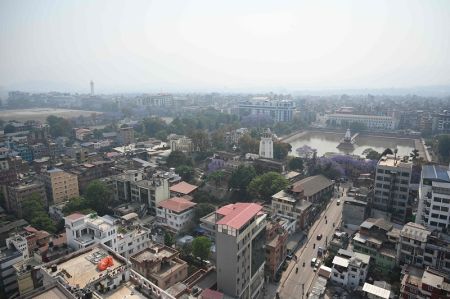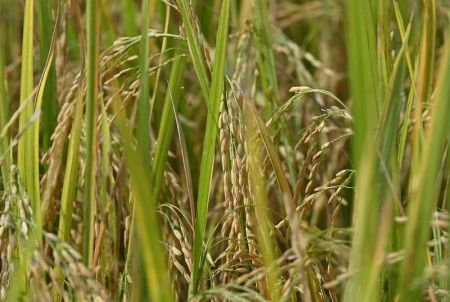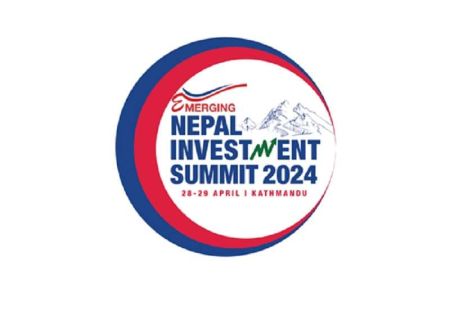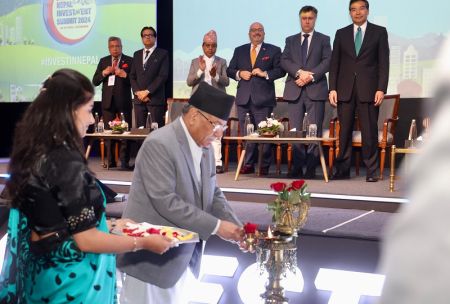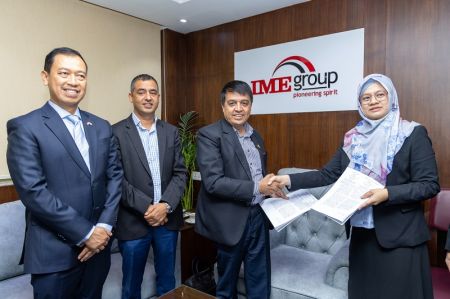
--By Gaurav Aryal
With the support of USAID NEAT, farmers across 14 districts now have different crops that are not only ensuring the food security of small farmers but also being a handsome source of income.
When the landless and marginalised communities did not have neither land nor crops in their farmland, they probably did not have other option than blaming their ‘bad fortune.’ USAID Nepal’s project, named Nepal Economic, Agriculture, and Trade (NEAT), has become a partner in ensuring food security and increasing financial access in Banke and Bardiya districts.
With the support of the project, farmers across 14 districts now have different crops that are not only ensuring the food security of small farmers but also being a handsome source of income.
Farmers have now gained skills, knowledge and access to the market. According to Phillip C Broughton, Chief of Party of the NEAT, when these conditions take place the impact of a project is there to stay. However, Hari Lal Dhakal, farmer of Vaishashur of Deudakala VDC, is not confident regarding the economic future of farmers like him, once the project comes to an end.
The project, which began on December 2010, has been working in order to promote economic growth, reduce poverty, increase food security and improve people’s lives in Nepal. According to the NEAT, the project’s objective to enhance economic opportunities and food security is divided into strengthening economic policies, increasing competitiveness of selected sector, enhancing food security and increasing access to microfinance services.

Food Security
The NEAT has been working with disadvantaged households that have been facing food insecurity. Though some of the donor driven projects seem to have fuelled dependency syndrome on recipients, NEAT has worked with a model to make farmers independent. According to USAID, the NEAT has enrolled farmers in phases, reducing the support on each phase and, therefore, making farmers self dependent with the knowledge, skills and market knowhow.
Since the NEAT began intervening farmers across several districts, they have adopted profit making crops instead of the traditional crops they were habituated. Tharu community of Motipur VDC in Bardiya is now involved in vegetables farming such as cabbage, cauliflower and cucumber, along with staple crops like paddy and wheat. Women in the community are now not only financially capable but also socially active. Radhika Chaudhary, a local farmer says, “We are now able to express our voice and actively participating in the self help groups.” Most of the households living in the area were dependent on either subsistence farming of staple food crops or labour work.
In the Motipur village, farmers now are making around Rs 100,000 to 150,000 per year depending upon the size of farmlands. Rajendra Sahu, Food Security Manager of the NEAT, said that one person makes Rs 30,000 in a season on average from cauliflower and Rs 40,000 from cucumbers in an area of three katthas of land.
With the increased income, Jagat Pyari, one of the exemplary farmers of Deudakala VDC, has added five katthas of land with the income made from her farmland. Along with 1.5 bighas of land of her own, she is also leasing two bighas of land and cultivating vegetables and cucumber along with crops like paddy and maize. With the increasing income level, farmers have also started sending children to schools. There are around 50 landless households who now farm either leasing or owning the land..
Similarly, in Vaishasur village, onion block of Deudakala VDC there are 17 agricultural groups. In these groups, 278 members are female and the remaining 104 are males. They farm onion, beans, cucumber and cauliflower. According to Kewal Singh Chaudhary, Field Technician, every group is involved in cultivation of four crops.
Bhim Bahadur Khatri, a returnee migrant worker of Saudi Arabia now regrets going abroad where he could not earn a good income. But now, working in his farmland, is making Rs 50,000 every six months and is building a house for his family. He says that he did not even make Rs 100,000 in three years working in Saudi Arabia. “I will never go abroad. When I am happy earning from home, why would I go there?” he said.
Although the agricultural policies prescribed by donors are said to be failing in Nepal. The attempt made by the NEAT project seems fruitful so far. Beneficiaries of the project, low scale farmers in Bardia and Banke district, are happy that NEAT was there to provide them support and lead them to be self sustaining on food and financial security.
According to the USAID, so far 71,342 households have benefitted from the USAID NEAT. Similarly, farmers’ sales have increased by US $ 85.44 million within one year working with NEAT. Likewise, 9,212 hectares lands are under improved management practices across the country. The NEAT also provided food security productivity trainings to local farmers and also linked food security farmers with input suppliers, collection centres, traders and micro finance institutions. Moreover, the project also equipped farmers with irrigation facilities and supplied tools and labours to complete the irrigation schemes. According to the official records of the NEAT, 1,203 irrigation systems were installed covering 2,567 hectares.
 Financial Services
Financial Services
Nepal is said to have around 80 percent of its population away from access to formal financial services. However, with the launching of cashless mobile banking services, people in rural areas with access to mobile telephony can now enjoy the banking services from their mobile phones. These services were launched after NEAT organized a summit in Kathmandu to address this issue.
Ramesh Kumar Chaudhary, resident of Thakurdwara VDC of Bardiya, is working as an agent of Laxmi Bank’s Hello Paisa initiative. He now has 160 customers from the village and registers a daily transaction of up to Rs 200,000. He is satisfied to see happy consumers who send and receive money from cities like Kathmandu, Pokhara and Nepalgunj. Before he provided mobile banking services, locals had to go to Bhurigaun, which is about 25 kilometres far away from the village.
Chaudhary is the first agent in the area. He says that a person is allowed to make a transaction of Rs 50,000 per day but only up to a limit of Rs 500,000 , as he is only given authority of that limit. Krishna Prasad Bhattarai, a customer, says that the availability of Hello Paisa agent in the village has helped him save time and cost to travel all the way to a nearest bank. “In that time, I can indulge in my own business,” said Bhattarai.
 Lentils enhance income sources
Lentils enhance income sources
Lentil farming under the competitiveness element of the NEAT has helped in increasing the yield of lentil crops by more than 50 per cent over baseline, according to the NEAT. Nepali lentil is finding its market in Bangladesh. Broughton says that the NEAT has also worked on bridging the gap between Nepali sellers and Bangladeshi buyers.
According to Dharma Prasad Pandey, Senior Programme Officer of FORWARD , there are 18 groups operating alone in Sanoshree VDC in lentil farming and a few more will be formed soon. He revealed that NEAT provided an assistance of Rs 50 million to the FORWARD.
Farmers think that they have now skills to be efficient and produce more. The productivity has increased by up to 35 per cent. Also, they are getting better prices for their products mainly because of the skills they have gained for grading of lentil grains and also because the collection centre pays a good price to them. In the past, farmers used to take their products to nearby markets such as Kohalpur but now buyers come to the village to purchase the production.
‘We had several noteworthy accomplishments in all project areas’
--PHILLIP C. BROUGHTON,Chief of Party, USAID Nepal Economic,Agriculture and Trade (NEAT) Activity
 NEAT project is almost coming to an end. How do you evaluate the success of the project?
NEAT project is almost coming to an end. How do you evaluate the success of the project?
NEAT is a broad project that aims to increase economic opportunities and enhance food security. We work in different sectors including agriculture, microfinance, and policy. For each of the components of NEAT, there are different indicators of success. In the agriculture component, we are looking to sustainably improve food security and resilience and increase income and competitiveness. In the microfinance component we are looking at enhancing access to financial services for disadvantaged populations and increasing the incomes of micro-entrepreneurs. We especially want to see more people having access to financial services in the rural area. Under our policy component, we are working with both the public and private sectors to improve the business and policy environment. At the policy level we are supporting improvements in trade, investment, and agriculture. In addition, we support fiscal policy improvements to improve the government’s ability to finance its budget.
Among various components which one do you think was the most successful one?
Well, I don’t think one is more successful than the others. This project is relatively short in nature, 32 months. Even though it is short, we have had great many accomplishments in all project areas. For example agriculture sales of project beneficiaries are significantly up over baseline figures. The number of rural households with access to financial services is increasing and in many cases through innovative outreach strategies such as mobile banking. And on the policy front, we have worked with the government and the private sector on more 35 different policies, 6 of which have already been implemented and many more are ready to be implemented once the new government is in place. We are very pleased with our progress and, even though this project is short, it is part of USAID’s long term strategy so our successful work will continue.
Trade is also one of the components of the NEAT. What are the achievements on this front?
In the trade area, we work on different levels – we have supported government and the private sector in analyzing trade issues with India and China, to identify issues that should be taken to the negotiating table to improve Nepal’s trading environment. We’ve supported government to look at transit issues given the cost of transporting cargo in and out of Nepal, and we’ve supported capacity building within the government related to trade, including on trade analysis and negotiation. At the operational level, we are helping to improve competitiveness and market access for tea, ginger and lentil. For example, with lentil, Bangladesh is the primary market. We are identifying ways to strengthen the relationship between Nepali sellers and Bangladeshi buyers. And we are also analyzing alternative markets so that Nepal’s lentil sector is not so dependent on Bangladesh.
How do you view the sustainability of these projects?
Sustainability is a key objective for us in all project areas. For example, under our food security component we work with over 28,000 beneficiaries. We provide training over 4 to 5 crop cycles, we help establish channels for high quality inputs, and we facilitate market access. 94 per cent of project beneficiaries said they now have access to high quality inputs, up from 21 per cent before the project started. 92 per cent of project beneficiaries are confident they have a market to sell their products in, up from just 50 per cent before the project started. Once project beneficiaries have skills and continuing access to inputs and markets, these won’t just go away. These are key factors in the sustainability of our food security work.
How long would it take to multiply the good impacts of NEAT to reach to the extent of import substitution?
Around 70 per cent of onions consumed in Nepal are imported from India. Given the market potential for Nepali grown onions, this season NEAT food security beneficiaries grew onions on more that 700 hectares of land and they have made very good income. We train farmers how to identify market opportunities. With import substitution, if there is opportunity to make money, farmers are going to do that. This is happening. We see it with onion and we see it with other commodities such as maize for the feed business.
A new project KISAN is being launched soon by USAID. How will this project give continuity to the activities of NEAT?
KISAN is working in many of the same districts as NEAT. They started just a few weeks ago yet we have already had several information sharing meetings. It is very important to USAID, NEAT, and KISAN that KISAN takes advantage of the experience gained by previous USAID projects and activities such as NEAT, NFRP, and EIG as well as other donor, government and private sector initiatives.






